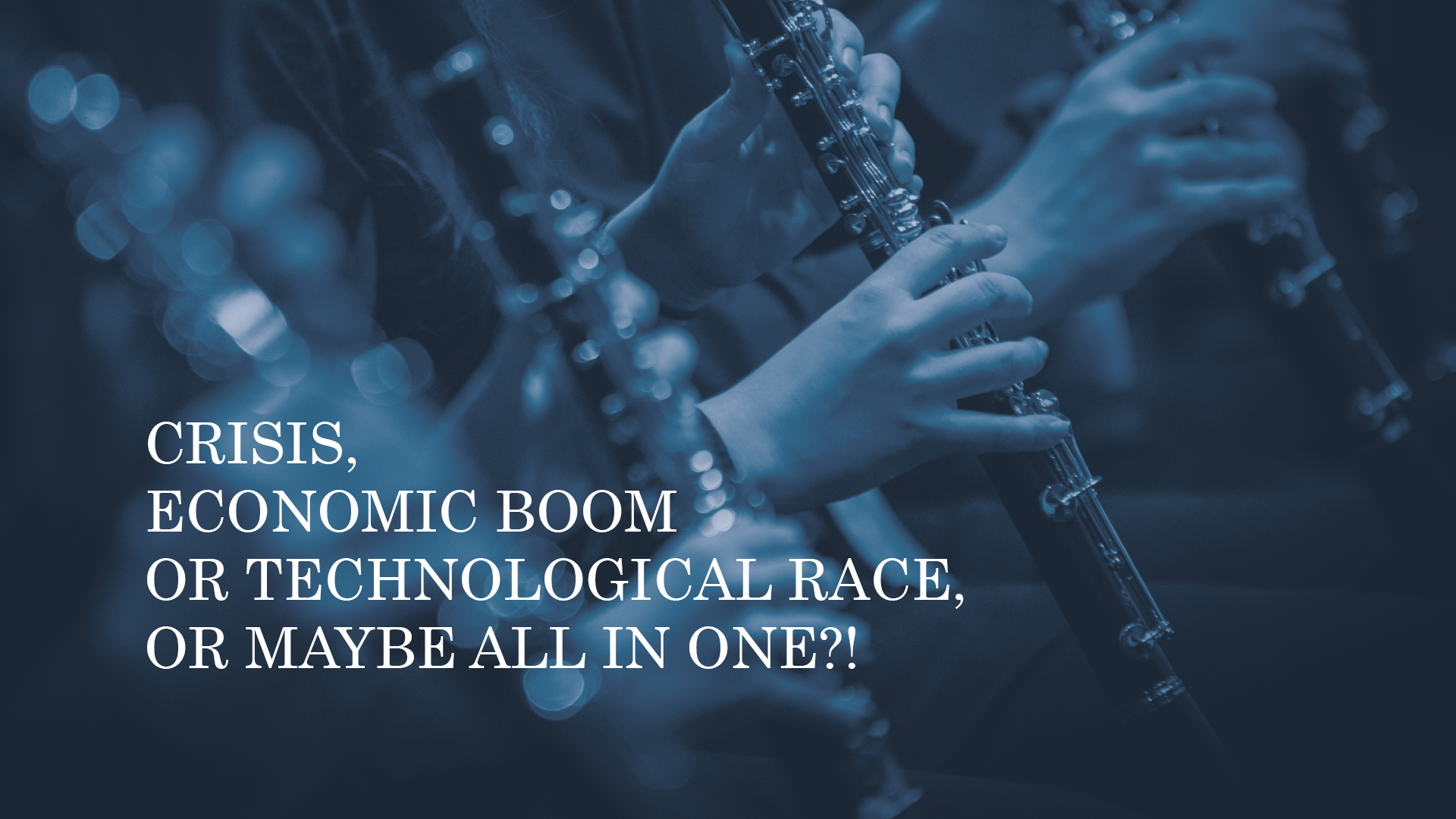CRISIS, ECONOMIC BOOM OR TECHNOLOGICAL RACE, OR MAYBE ALL IN ONE?!

Indeed, in the last eighteen months we’ve had both a crisis as well as an economic boom. Like never before, entrepreneurs are now even more open to taking risks and embarking upon new challenges. More and more entrepreneurs set up new businesses, often deciding on scaling them up internationally. Of course the aim is to take advantage of the current global trends and developments, and sometimes even taking part in technological races.
INNOVATIVE TECHNOLOGIES AND POLISH INGENUITY
Today more than ever entrepreneurs need to demonstrate ingenuity, which has always been a feature of the Polish mentality. The world has definitely accelerated and Poland is taking advantage of new opportunities opening up. New technologies are developing much faster than was once thought and we play a large part in creating new technological solutions. The complex processes taking place in the economy, geopolitics, consumer habits are subject to dynamic changes and acceleration, which means that current linear forecasts are no longer correct. We must be ready for anomalies, including growth anomalies.
DOES IT MATTER HOW OLD THE ENTREPRENEUR IS?
I have also noticed another major change, and that is the average age of entrepreneurs looking for professional support in scaling their business. Today’s 25- to 30-year-olds create very impressive, most often innovative companies. Despite only being established for a few short years or sometimes even just months, they boast high growth dynamics and impressive turnovers. Today’s business is built upon new dynamics brought in by young entrepreneurs. Those allow for technology to develop very quickly, but this in turn can make it almost immediately unattractive (obsolete) if this development is not accompanied by adequate commercialisation.
The courage and global outlook of the younger generation of Poles is no different from the way business is done on the other side of the Atlantic. Young Polish entrepreneurs don’t look at specific business areas – they look for areas with the greatest potential for development and demand for innovation. They are relatively well educated, hold specialist knowledge and they use both to successfully compete with Silicon Valley founders. According to global reports, the average age of successful start-up founders is 34-45 years. However this trend is changing dramatically, which is not at all surprising given that the younger generation’s risk appetite is greater and it also is better at catching arising opportunities.
POLES IN THE WORLD
Panasiuk & Partners’ clients most frequently ask for support in scaling businesses up internationally. South America or far Asia are the main directions of expansion. Changes have been happening at such speed that entrepreneurs already feel at home in Europe. This does not mean that they do not need or expect support. They come for support in setting up structures when their businesses in Europe are already operational and sometimes even profitable. The most popular countries are the Czech Republic, Germany, Russia, the Balkan region and sometimes even the UK, France or Scandinavia, etc. When we meet with our clients, it seems to us the only way the market is going is up.
HOW TO EXPLAIN THIS ECONOMIC BOOM?
The current economic situation is so dynamic and surprising (one moment we expect a crisis only to read about growth forecasts in the next), that in order to understand it we must look into the past. After periods of enormous non-financial disruptions, such as wars and pandemics, the economy tends to recover. But the actual shock caused to the economy is the reason for “disturbances” such as: knocking people out of their comfort zones, the necessity to meet new needs, and their being in brand new situations which lead to new behaviours – so new that they undermine the old economic structures.
The cholera pandemic hit Western Europe hard in the first half of the nineteenth century. Within a month, the disease filled hospitals and took away almost 3% of Parisians. On the other hand, the end of this plague caused a significant economic recovery, and was followed by an industrial revolution in France and Great Britain.
Isn’t this reminiscent of the present time? When looking for historical analogies, some analyses focus on sudden political changes with unpredictable economic consequences. It is difficult to look away from the Polish political scene here, but for obvious reasons I will ignore this topic.
WHAT ECONOMIC CHANGES WILL THE PANDEMIC BRING NEXT?
The changes affected by the revolution caused by COVID-19 brought the opportunity to take advantage of new global trends and of opportunities for above-average business development. Today, as entrepreneurs try to fill in the gaps that have arisen in the market, we are seeing a definite change in the way money is made. Society’s ongoing education, plus a large dose of entrepreneurs’ courage, as well as new consumer needs and businesses, are the primary catalysts behind the globalisation of business both on the supply (business) and demand (consumer) side. Never before have so many people been so open to the digitalisation of their professional and consumer lives.
Today, many entrepreneurs who were forced to make 180-degree turns see that the changes they implemented in 2020 have brought much better results than their previous attempts over many years of efforts. The below chart shows the current trends:

WHAT LIES AHEAD?
Until recently, Covid was still ravaging poorer countries. On the other side of that coin, the developed world is on the verge of a post-pandemic boom. Or has the boom already happened perhaps? Certainly, fears of a crisis – despite the different opinions of those experts who predict it – have been put to sleep. As the number of hospitalisations and deaths from the virus has been tangibly decreasing, the level of fear over the pandemic has gone down significantly. The fourth wave is being spoken about in much calmer voices today.
WHAT ABOUT THE ECONOMY?
Forecasters believe that the economy will grow by at least a few percentage points faster this year than the pre-pandemic trend. The Economist’s analysis of GDP for the G7 economies suggests (Figure 1) that such a synchronised acceleration relative to trend is rare and posits that this has not happened since the post-war boom of the fifties.

However, The Economist also suggests this: “Enjoy the incoming economic boom while it lasts as it could have a sting in the tail.”
ARE YOU AN ENTREPRENEUR? WHAT SHOULD YOU DO?
During such dynamic times, one of the best investment practices is to consistently implement plans related to the development of companies using the potential of the New World. Poles tend to quickly adapt to new circumstances. It is also the best way to become independent from disturbances of a geopolitical nature, i.e. healthy diversification. It is worth remembering during this entire journey, that before our business achieves values worthy of an exit, it should first be setup correctly. The “GO, GO, GO and then we’ll fix it” method can have painful consequences, not only legal and tax, but above all from a business standpoint. Therefore, let’s think through our way into the world. I shall keep my fingers crossed for your success!

Blog edited by dr Anna Maria Panasiuk

Founder and Managing Partner of Panasiuk & Partners, with many years of expertise in wealth management.
Authors
dr Maja Czarzasty- Hercberg
OF COUNSEL/ATTORNEY-AT-LAW
Dorota Sajewicz
investment partner
dr Adam Barcikowski
Head of Tax | Certified Tax Advisor
Marta Kwiatkowska - Abramowska
legal assistent
Sylwia Rozwandowicz
ADVOCATE
Sylwia Rybicka
dyrektor ds. rozwoju
Michał Nowacki
radca prawny
Paweł Turek
doradca podatkowy
Katarzyna Zając
aplikant radcowski
Yours Panasiuk
Antoni Goraj
radca prawny
Edyta Winnicka
prawnik
Paweł Szumowski
aplikant radcowski
Yours Panasiuk
Katarzyna Bieńkowska
radca prawny,
doradca podatkowy YOURS Panasiuk
Kamil Kowalik
doradca podatkowy
Monika Baran
radca prawny
Adam Apel
doradca podatkowy
Piotr Świąć
adwokat
Sabina Tyszko
tax consultant
Szczepan Adamski
OF COUNSEL | LAWYER | PRESIDENT OF THE MANAGEMENT BOARD OF YOURS SP. Z O.O.
Magda Kwiatkowska
radca prawny
Andrzej Sałamacha
PARTNER | ATTORNEY-AT-LAW | CERTIFIED INSOLVENCY AND RESTRUCTURING ADVISOR
dr Anna Maria Panasiuk
managing partner | advocate | wealth advisor
Maciej Małachowski
TRAINEE ATTORNEY-AT-LAW
Klaudia Borkowska
Advocate trainee
Archives
-
2024

-
2023

-
2022

-
December

- POLISH FAMILY FOUNDATION – A new solution for entrepreneurs
- POLSKA FUNDACJA RODZINNA – nowe rozwiązanie dla przedsiębiorców
- INVESTMENT FUNDS IN THE NETHERLANDS – ABC OF SETTING UP OF AIF
- FUNDUSZE INWESTYCYJNE W HOLANDII – ABC ZAŁOŻENIA AFI
- TAX INCENTIVES TO INVEST IN AN ALTERNATIVE INVESTMENT FUND (AIF)
- ZACHĘTY PODATKOWE DO INWESTYCJI W ALTERNATYWNĄ SPÓŁKĘ INWESTYCJNĄ (ASI)
-
November

-
October

- CAN AN ALTERNATIVE INVESTMENT FUND SERVE THE PURPOSES OF PRIVATE INVESTMENTS?
- CZY ALTERNATYWNA SPÓŁKA INWESTYCYJNA MOŻE SŁUŻYĆ PRYWATNYM INWESTYCJOM?
- M&A – TRANSACTION TRIVIA IN MERGERS & ACQUISITIONS
- M&A – CIEKAWOSTKI TRANSAKCJI MERGERS & ACQUISITION
- HISZPAŃSKA REZYDENCJA PODATKOWA – PUZZLE DLA WTAJEMNICZONYCH!
- Spanish tax residence – jigsaw puzzles for the initiated!
-
September

-
August

-
July

-
May

- PODWÓJNA REZYDENCJA PODATKOWA – 4 PRZYKŁADY POWSTANIA [CZĘŚĆ II OSOBY PRYWATNE]
- DUAL TAX RESIDENCE – 4 EXAMPLES OF ITS EMERGENCE [PART II NATURAL PERSONS]
- INVESTORS’ Q&A ABOUT THE ALTERNATIVE INVESTMENT FUNDS
- O CO NAJCZĘŚCIEJ PYTAJĄ INWESTORZY W KONTEKŚCIE ASI (ALTERNATYWNYCH SPÓŁEK INWESTYCYJNYCH)?
- REVOLUTION ON THE MERGERS & ACQUISITIONS MARKET – RECORD-BREAKING M&A TRANSACTIONS IN POLAND
- REWOLUCJA NA RYNKU FUZJI I PRZEJĘĆ – REKORDOWE TRANSAKCJE M&A W POLSCE
- 7 SINS COMMITTED WHILE RUNNING A BUSINESS AND MAKING INVESTMENTS
- 7 GRZECHÓW PRZY PROWADZENIU BIZNESU I INWESTYCJACH
-
April

-
March

-
February

- SIMPLE CONSERVATIVE INVESTMENTS. HISTORICAL ANALYSIS OF THE LAST 20 YEARS
- PROSTE INWESTYCJE KONSERWATYWNE. ANALIZA HISTORYCZNA OSTATNICH 20 LAT
- CZY WARTO ZAMIESZKAĆ W HISZPANII? PRAWO BECKHAMA, CZYLI JAK NIE PŁACIĆ PODATKÓW W HISZPANII
- IS IT WORTH LIVING IN SPAIN? BECKHAM ‘S LAW, HOW TO AVOID PAYING TAXES IN SPAIN
- ESTONIAN CIT 2022 AS A REMEDY FOR THE POLISH DEAL
- ESTOŃSKI CIT 2022 JAKO REMEDIUM NA POLSKI ŁAD
-
January

- HOW CAN YOU SET UP AN ALTERNATIVE INVESTMENT FUND IN A FEW WEEKS?
- JAK MOŻNA ZAŁOŻYĆ ALTERNATYWNĄ SPÓŁKĘ INWESTYCYJNĄ W KILKA TYGODNI?
- DO CLOSED-END INVESTMENT FUNDS STILL PAY OFF?
- CZY FUNDUSZE INWESTYCYJNE ZAMKNIĘTE JESZCZE SIĘ OPŁACAJĄ?
- 6 REASONS WHY IT IS WORTH DEVELOPING A BUSINESS OUTSIDE POLISH BORDERS
- 6 POWODÓW, DLA KTÓRYCH WARTO ROZWIJAĆ BIZNES POZA POLSKĄ
-
December
-
2021

-
December

-
November

-
October

- LIFE IN TENERIFE – TAXES AND REAL ESTATE IN THE CANARY ISLANDS
- TENERYFA NA ŻYCIE – PODATKI I NIERUCHOMOŚCI NA WYSPACH KANARYJSKICH
- TURNKEY REORGANISATION – HOW TO PREPARE A BUSINESS FOR INTERNATIONAL EXPANSION
- REORGANIZACJA POD KLUCZ CZYLI JAK PRZYGOTOWAĆ BIZNES NA EKSPANSJĘ ZAGRANICZNĄ
- BUSINESS EXPANSION OUTSIDE THE EU – LET’S HAVE A LOOK AT OTHER CONTINENTS
- EKSPANSJA BIZNESU POZA UE – SPÓJRZMY NA INNE KONTYNENTY
-
September

-
August

- MAJĄTEK RODZINNY
- COMPANY RELOCATION WITHIN THE EU: PROCESS ANALYSIS AND CASE STUDY
- PRZENIESIENIE SPÓŁKI W OBRĘBIE UE: ANALIZA PROCESU I CASE STUDY
- SCALING UP BUSINESS. TAXES IN ESTONIA, ITALY, UNITED KINGDOM, MALTA AND CYPRUS – COMPARISON
- EKSPANSJA BIZNESU. PODATKI W EUROPIE.
- POLSKI ŁAD OCZAMI PRZEDSIĘBIORCY
-
July

- EXPANDING NEXT DOOR – THE CZECH REPUBLIC, SLOVAKIA, GERMANY, ROMANIA
- EKSPANSJA PO SĄSIEDZKU – CZECHY, SŁOWACJA, NIEMIECY, RUMUNIA
- CONVERTIBLE DEBT IN POLAND
- CONVERTIBLE DEBT PRZY INWESTYCJACH PRE-SEED
- AIFs (ALTERNATIVE INVESTMENT FUNDS) LEAD THE WAY ON THE POLISH CAPITAL MARKET
- ASI WIEDZIE PRYM NA POLSKIM RYNKU KAPITAŁOWYM
- FAMILY FOUNDATIONS IN POLAND. CONCEPT VERSUS ENTREPRENEURS’ EXPECTATIONS
- FUNDACJA RODZINNA W POLSCE. ISTOTA POMYSŁU A OCZEKIWANIA PRZEDSIĘBIORCÓW
-
June

- CORPORATE TAX RELIEF AND INCENTIVES FOR INVESTORS – NEW (BETTER?) SOLUTIONS
- ULGI PODATKOWE I ZACHĘTY DLA INWESTORÓW – IDZIE NOWE (LEPSZE?)
- 9% CIT ZAMIAST 19%, JAK PŁACIĆ NIŻSZY PODATEK
- CYPRUS VS. UNITED ARAB EMIRATES, WHERE TO MOVE? CHANGE OF TAX RESIDENCE
- CYPR VS. ZJEDNOCZONE EMIRATY ARABSKIE, GDZIE SIĘ WYPROWADZIĆ? ZMIANA REZYDENCJI PODATKOWEJ
-
May

-
April

-
March

-
February

-
January

- 6 MAJOR CHANGES IN THE BEHAVIOUR OF PRIVATE INVESTORS AND THEIR PORTFOLIOS IN 2020
- 6 GŁÓWNYCH ZMIAN W ZACHOWANIACH I PORTFELACH INWESTORÓW PRYWATNYCH W ROKU 2020
- TAX SIMPLIFICATION 2021 IN POLAND – A MAGNET FOR FOREIGN INVESTORS
- UPROSZCZENIA PODATKOWE 2021 W POLSCE – MAGNESEM DLA INWESTORÓW ZAGRANICZNYCH
- ALTERNATIVE INVESTMENT FUND (AIF) – A FIRST-CLASS INVESTMENT VEHICLE AT YOUR FINGERTIPS
- ALTERNATYWNA SPÓŁKA INWESTYCYJNA (ASI). PIERWSZORZĘDNY WEHIKUŁ INWESTYCYJNY NA WYCIĄGNIĘCIE RĘKI
- ESTONIAN CIT – EFFECTIVE REDUCTION IN CORPORATE TAX IN POLAND
- CIT ESTOŃSKI – EFEKTYWNE OBNIŻENIE OPODATKOWANIA SPÓŁEK W POLSCE
-
December
-
2020

-
December

-
November

- WE BREAK STEREOTYPES! PRECONCEPTIONS ABOUT LAWYERS AND THE REALITY OF BUSINESS
- AM I REALLY SAVING MYSELF MONEY? TODAY I WILL SAVE 100 PLN TO LOSE 1000 PLN TOMORROW
- ŁAMIEMY STEREOTYPY! CZYLI PRZEKONANIA O PRAWNIKACH, A REALIA BIZNESU
- CZY TO NAPRAWDĘ OSZCZĘDNOŚĆ? DZIŚ „ZAOSZCZĘDZĘ” 100 ZŁ ŻEBY JUTRO STRACIĆ 1000 ZŁ
- ZAPRASZAMY do MONAKO
- WHY IS IT WORTH BECOMING A TAX RESIDENT OF MONACO?
- DLACZEGO WARTO ZOSTAĆ REZYDENTEM MONAKO? PODATKI W MONAKO
-
October

-
September

-
August

-
June

- THE WORLD IS CHANGING, AND YOU ARE STILL LOOKING FOR A UNICORN? In this article, we tell you everything you need to know to find one
- ŚWIAT SIĘ ZMIENIA, A TY WCIĄŻ SZUKASZ JEDNOROŻCA. Wszystko co musisz wiedzieć aby go znaleźć napisaliśmy tutaj
- KRYZYSOWE INWESTYCJE, CZYLI: ODWAŻNA INWESTYCJA WYMAGA OSTROŻNEGO PLANOWANIA
- JAK TRWOGA TO DO PRAWNIKA – NIEPOKOJĄCE TENDENCJE WŚRÓD STARTUPÓW
-
May

-
April

- AMERICAN TAX COMPETITION. HELPFUL OR “HARMFUL”
- KONKURENCJA PODATKOWA PO AMERYKAŃSKU. POŻĄDANA, CZY „SZKODLIWA”
- PIENIĄDZE TO NIE WSZYSTKO. Czyli jak inwestować, żeby nie stracić
- INVESTING IN HARD TIMES: HOW TO SET UP YOUR BUSINESS IN NEW YORK
- APETYT NA INWESTYCJE W TRUDNYCH CZASACH. SPÓŁKA W NOWYM YORKU
- WPŁYW PANDEMII NA TRANSAKCJE FUZJI I PRZEJĘĆ
- IMPACT OF A PANDEMIC ON MERGERS AND ACQUISITIONS
- PODATKI NA TRUDNE CZASY
-
March

-
February

-
December
-
2019

-
2018

-
2017

-
2016

-
2015

-
December

-
November

- Zwrot PCC od czynności restrukturyzacyjnych z udziałem spółek komandytowo-akcyjnych
- Zmiany podatkowe na Cyprze zachętą dla potencjalnych inwestorów
- Cypryjskie fundusze inwestycyjne mogą korzystać ze zwolnienia podatkowego w Polsce
- Nowe sankcje za niezłożenie sprawozdania finansowego
- Europejskie poświadczenie dziedziczenia
-
October

-
July

-
December
Categories
- Alternative Investment Fund (15)
- Expansion (12)
- Investments (34)
- Jurisdictions (11)
- Law (13)
- M&A (11)
- POLISH FAMILY FOUNDATION (2)
- Polish Holding Company (2)
- Relocation (9)
- Reorganisation (6)
- Succession (9)
- Tax (28)
- Tax accounting (2)
- Tax Preferences (2)
- Tax Residence (10)
- Wealth Advisory (9)
New publications
You want to be up to date, enter your e-mail address and you will receive new publications straight to your inbox:

